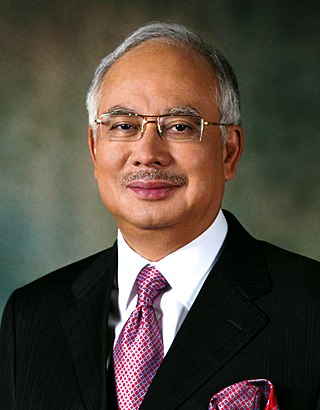
Mohammad Najib bin Tun Haji Abdul Razak is a Malaysian politician who served as the sixth Prime Minister of Malaysia from 2009 to 2018. In 2020, he was convicted of corruption in the 1Malaysia Development Berhad scandal, one of the largest money-laundering and embezzlement scandals in history. He is the son of former prime minister Abdul Razak Hussein. Najib Razak was the chairman of the Barisan Nasional (BN) coalition from April 2009 to May 2018 and the president of the United Malays National Organisation (UMNO) from November 2008 to May 2018, which had maintained control of Malaysia's government with a parliamentary majority for more than sixty years until the coalition's defeat in the 2018 general election.
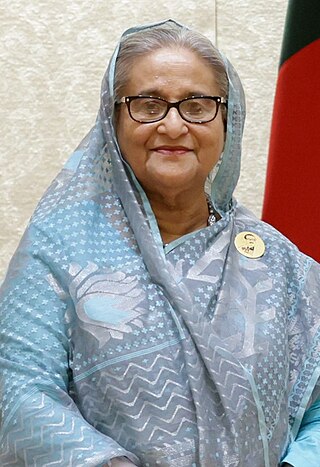
Sheikh Hasina Wazed is a Bangladeshi politician who has served as the tenth prime minister of Bangladesh from June 1996 to July 2001 and again since January 2009. She is the daughter of Sheikh Mujibur Rahman, the founding father and first president of Bangladesh. Having served for a combined total of over 19 years, she is the longest serving prime minister in the history of Bangladesh. As of 3 May 2024, she is the world's longest-serving female head of government.

Bangladesh–India relations are the bilateral relations between the People's Republic of Bangladesh and the Republic of India, both of which are South Asian neighbours. Diplomatic relations between the two countries formally began in 1971 with India's recognition of an independent Bangladesh following India's military intervention helping Bangladesh secure independence following the 1971 India-Pakistan War. On 6 December, Bangladesh and India celebrate Friendship Day commemorating India's recognition of Bangladesh and the continued friendship between the two countries.

Bilateral ties between Malaysia and the United States were established upon Malayan independence in 1957. The US was, and still is one of the largest trading partners for Malaysia and is traditionally considered to be Malaysia's oldest and closest ally in military, economic and education sectors. Malaya was the predecessor state to Malaysia, a larger federation formed through the merger of Malaya, North Borneo, Sarawak and Singapore in 1963. Immediately before the merger, the latter three territories were previously part of the British Empire. But the US has had consular and commercial presence in Malaya since the 1800s. US merchants, especially Joseph William Torrey together with Thomas Bradley Harris also had commercial interests in north western coast of Borneo in the 19th century as well, where they established the American Trading Company of Borneo.

Malaysia–Russia relations are the bilateral foreign relations between the two countries, Malaysia and Russia. Russia has an embassy in Kuala Lumpur, and Malaysia has an embassy in Moscow.

Germany–Malaysia relations are the foreign relations between Germany and Malaysia. Germany has an embassy in Kuala Lumpur, and Malaysia has an embassy in Berlin.

Malaysia–Sweden relations refers to foreign relations between Malaysia and Sweden. Sweden has an embassy in Kuala Lumpur, and Malaysia has an embassy in Stockholm. As of 2009, 90 Swedish companies are present in Malaysia and about 450 Swedish citizens live in Malaysia. The number of Swedish citizens visiting Malaysia in 2011 was 44,138.

India–Malaysia relations, also called Indian-Malaysian relations or Indo-Malaysian relations, are the bilateral foreign relations between India and Malaysia. India has a high commission in Kuala Lumpur, and Malaysia has a high commission in New Delhi and a consulate general in Chennai and Mumbai. Both countries are full members of the Commonwealth of Nations, Asian Union and G15. India and Malaysia are also connected by various cultural and historical ties that date back to antiquity. The two countries are on excellently friendly terms with each other seeing as Malaysia is home to a strong concentration of Indian immigrants. Mahathir Mohamad, the fourth and longest serving Prime Minister of Malaysia has Indian ancestry. On trade front their bilateral trade volume stands at $10.5 billion and is poised to reach $25 billion by 2020.

Malaysia–Oman relations refers to the bilateral relationship between Malaysia and Oman. Malaysia has an embassy in Muscat, and Oman has an embassy in Kuala Lumpur.
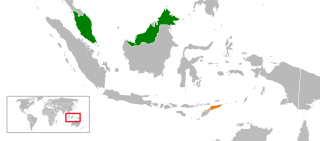
East Timor–Malaysia relations or Malaysia–Timor-Leste relations are foreign relations between Malaysia and East Timor. Malaysia has an embassy in Dili, and East Timor has an embassy in Kuala Lumpur. Malaysia is supporting East Timor to be one of the members of ASEAN and towards becoming a democratic country.

Malaysia–Turkmenistan relations refers to foreign relations between Malaysia and Turkmenistan. Malaysia has an embassy in Ashgabat, and Turkmenistan has an embassy in Kuala Lumpur.

Kazakhstan–Malaysia relations refers to foreign relations between Kazakhstan and Malaysia. Kazakhstan has an embassy in Kuala Lumpur, and Malaysia has an embassy in Astana.

Kyrgyzstan–Malaysia relations refers to foreign relations between Kyrgyzstan and Malaysia. Kyrgyzstan has an embassy in Kuala Lumpur, while Malaysia embassy in Tashkent, Uzbekistan is also accredited to Kyrgyzstan.

Malaysia–Qatar relations are foreign relations between Malaysia and Qatar. Malaysia has an embassy in Doha, and Qatar has an embassy in Kuala Lumpur since 2004.
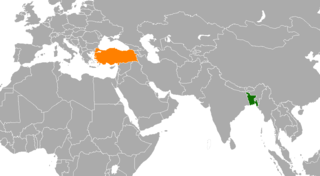
Bangladesh–Turkey relations are the bilateral relations between Bangladesh and Turkey. Both countries are members of the Organisation of Islamic Cooperation. Turkey has an embassy in Dhaka and Bangladesh has one in Ankara and a consulate in Istanbul.

Malaysia–Nepal relations refers to bilateral foreign relations between Malaysia and Nepal. Malaysia has an embassy in Kathmandu, and Nepal has an embassy in Kuala Lumpur.
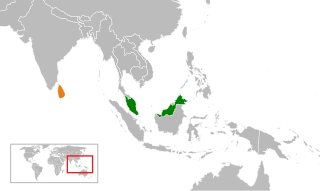
Malaysia–Sri Lanka relations refers to the bilateral foreign relations between Malaysia and Sri Lanka. Malaysia has a high commission in Colombo, and Sri Lanka has a high commission in Kuala Lumpur. Both countries are members of the Commonwealth of Nations and the Group of 77.
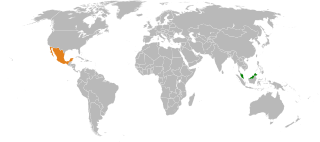
Malaysia–Mexico relations are the bilateral relations between Malaysia and Mexico. Both nations are mutual members of the Asia-Pacific Economic Cooperation.

Algeria has an embassy in Kuala Lumpur, and Malaysia has an embassy in Algiers.

Bangladesh–France relations relate to the foreign relationship between Bangladesh and France.





















